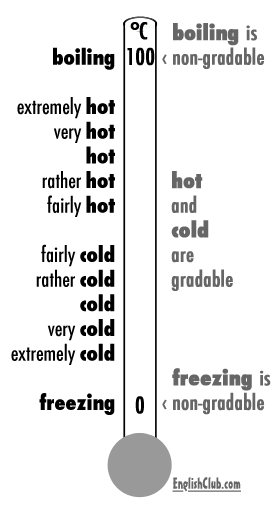TIP:
Don't try to learn lists of gradable and non-gradable adjectives! It's better to understand what makes an adjective gradable or non-gradable. This is a matter of logic and common sense. Most native-speakers have never heard of gradable and non-gradable adjectives. They just "feel" that it doesn't make sense to say "fairly excellent" or "very unique". You probably have the same idea in your language.
Adjective Gradability
Adjectives describe qualities (characteristics) of nouns. Some qualities can vary in intensity or "grade", for example:
- rather hot, hot, very hot; hot, hotter, the hottest
The adjective hot is gradable.
Other qualities cannot vary in intensity or grade because they are:
- extremes (for example: freezing)
- absolutes (for example: dead)
- classifying (for example: nuclear)
The adjectives freezing, dead and nuclear are non-gradable.

Gradable / Non-gradable adjectives
Adjectives can be either gradable or non-gradable
Gradable
Gradable adjectives are adjectives like ‘cold’ ‘hot’ and ‘frightened’. You can be very cold or a bit cold. Gradable adjectives show that something can have different degrees.
Non-gradable
Non-gradable adjectives are adjectives like ‘married’ or ‘wooden’. You can’t be very married or a bit married. Non-gradable adjectives do not have different degrees.
Adjectives like ‘terrifying’, ‘freezing’ ‘amazing’ are also non-gradable adjectives. They already contain the idea of ‘very’ in their definitions – ‘freezing’ means ‘very cold’ etc.
Using adverbs of degree
When we use adverbs of degree to modify adjectives we usually have to use different adverbs for gradable and non-gradable adjectives.
With gradable adjectives
- It’s a bit cold in here. Shall I turn the fire on?
- He’s very interested in history. Why don’t you buy him a history book?
- This exercise is really difficult. I don’t know any of the answers.
- I’m extremely tired. I’m going to bed.
The adverbs a bit, very, really, extremely and quite can all be used with gradable adjectives.
With non-gradable adjectives
- It’s absolutely freezing in here. Shall I turn the fire on?
- He’s completely fascinated by history. Why don’t you buy him a history book?
- This exercise is absolutely impossible.
- That film is really terrifying. Don’t go and see it on your own.
The adverbs absolutely and completely can be used with non-gradable adjectives.
Notice that really can be used with both gradable AND non-gradable adjectives.
NOTE: There are other adverbs of degree that we haven’t covered in this section. The ones included here are some of the most common.
- See more at: https://learnenglish.britishcouncil.org/es/quick-grammar/adjectives-gradable-non-gradable#sthash.AgIEb4Wm.dpuf

















































